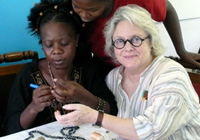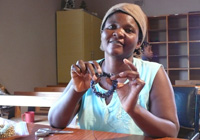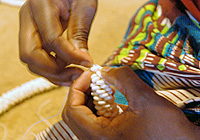
Reportaje
Abataka: Women shape their future
07 de marzo de 2008
07 marzo 200807 marzo 2008International Women’s Day on 8 March is a global day of celebration to inspire women and celebrat
International Women’s Day on 8 March is a global day of celebration to inspire women and celebrate their achievements. The theme of 2008 is “Investing in Women and Girls”. UNAIDS Special Representative Mary Fisher and the women artisans of the Lusaka Zambia jewellery project believe income generation projects are critical in empowering women living with HIV, enabling them to shape their future.
Employment to empower HIV positive women

UNAIDS Special Representative Mary Fisher with the artisans of the Lusaka Jewellery project.
Credit: Mary Fisher
As an advocate for those who share her HIV positive status, UNAIDS Special Representative Mary Fisher has had the opportunity to travel and meet women around the world. Listening to them she saw how employment could contribute to empowering women living with HIV, especially those living in poverty.
“Everywhere I’ve travelled,” she said, “I’ve seen women struggling to sustain themselves and their families against the burden HIV places on them”.
So in 2006 Ms Fisher began to explore sustainable income-generation ideas through which HIV positive women in Zambia and Rwanda could earn a living, care for their families and sustain their health. She met and talked with women to find a product they could make with the traditional skills they already had or could learn which could be sold at a profit.

In Lusaka Zambia the traditional craft of bead-making is getting a modern twist.
Credit: Mary Fisher
The idea of modern fashion jewellery created with the traditional craft of beading which could be promoted and sold by the internet including on Mary Fisher’s website was born.
Making an impact
Today, the jewellery project is thriving. Around 150 HIV positive women who participate in support groups at the Centre for Infectious Disease Research in Zambia (CIDRZ), a Lusaka-based HIV/AIDS research, treatment and care facility; or who live in the local Chikumbuso community, have been trained and employed as jewellery makers.

Modern jewellery designs by artist Mary Fisher are crafted by bead-crocheting.
Credit: Mary Fisher
Mary Fisher is an international artist and the combination of her modern jewellery designs with the women’s traditional craft of bead making is proving a success. The artisans practice the intricate art of bead-crocheting with materials and gemstones and sales are going well. Nearly three dozen varieties of bracelets, designed by artist Mary Fisher, are now in production, with more items on the drawing board. The women are paid for each piece they create and additional profits are invested to buy more materials and employ more women.
Fisher has named some of the jewellery pieces the Abataka Collection as Abataka means “family, community, belonging”.
“I can give my children an education”
On any given day, several dozen women artisans may gather to work on the jewellery and share life stories.
Esther’s story is typical: She contracted HIV from her husband, passed it unknowingly to four of their five children and, since her husband’s death in 2005, raises her family alone.
Before, Esther and her children often skipped doses of HIV medication because they had no food to take them with. Now, they have money for housing, for food – even for books and fees, to keep the children in school. “I am very grateful to God for the beading project so I can give my children education,” she said.
When Esther and her co-workers finish each bracelet, they mark it with a tag to which they sign their names. The signed handiworks make the bracelet makers and bracelet buyers feel like allies across the globe responding to AIDS. One group of buyers in Arizona sent photographs of themselves wearing their bracelets to the Zambian artisans with personal letters of thanks and encouragement.
Looking to the future
With their new earnings and skills from the jewellery project, HIV-positive women artisans aren’t just living day to day, but looking to the future. Many have been able to open savings accounts, start their own small businesses, and obtain better housing for their families.
Ms Fisher calls it the very definition of “the spirit of Abataka: people from around the world befriending African women on their journey. With the world’s help, these women are looking towards a brighter future".
Reportajes relacionados
 La sororidad y la información como respuesta a la violencia de género
La sororidad y la información como respuesta a la violencia de género
15 de diciembre de 2023
 La urgencia de prevenir el VIH entre las adolescentes y las mujeres jóvenes
La urgencia de prevenir el VIH entre las adolescentes y las mujeres jóvenes
01 de junio de 2023
